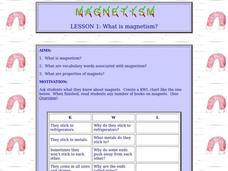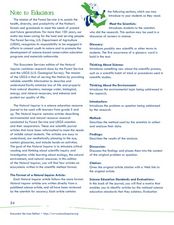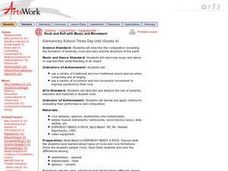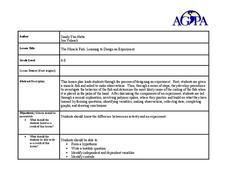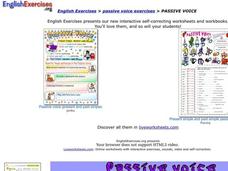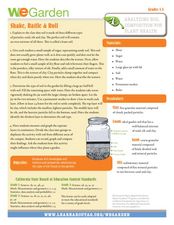Curated OER
A Golden Opportunity for Science
Students participate in a varity of activities surrounding "gold." They explore the science, myths, and legends about gold and conduct a debate over the environmental problems created by gold mining in a small small mining town.
Curated OER
What is Magnetism?
Learners investigate magnetism. For this physics lesson, students create a KWL chart about magnetism and research various suggested websites to find out more about magnetism. Learners log on to the "BrainPOP" website and view a short...
Curated OER
Natural Inquirer Ecosystem Article Lesson
Students discover new ways to preserve the ecosystem by completing graphic organizers. For this environmental lesson, students read an article from the Natural Inquirer in small groups and fill out a graphic organizer based on the...
Curated OER
Africa: Economics And Change
Young scholars examine the gold-mining industry in Africa. In this geography skills lesson, students watch "Africa: Economics and Change," investigate the challenges of working in mines, research attributes and production of gold and...
Curated OER
Soil in My Food Web
Fourth graders understand the importance of soil to the food web. In this food web lesson, 4th graders create various food webs beginning with soil using yarn and name cards. Students write about the importance of soil to one...
Curated OER
What Is It?
Play the game of Tag and differentiate between plants and animals. Explore the characteristics of plants. Identify the major parts of plants (e.g., seeds, stem, pistil) and describe their basic functions. Compare the requirements of some...
Curated OER
Rock and Roll with Music and Movement
Fourth graders improvise music and dance to express their analysis of types of rocks. They discuss the three classes of rocks, list describing words, and create a short musical piece and dance to symbolize the rock they are dancing.
Curated OER
Red, Green, and Blue Mystery Liquids! Hypothesis or Inference?
Eighth graders are actively involved in the scientific method and inquiry as they form quick hypotheses based upon a teacher set of mystery liquids. They determine the need to make additional observations of the liquids.
Curated OER
Nature's Polyhedrons
Students are introduced to polyhedrons through using straw models to explore geometric solids and constructing Christmas tree ornaments using Epsom salt crystals. Students will view interactive videos and investigate and retrieve...
Curated OER
Saltwater Science
Students conduct an experiment that shows them how salt water allows things to float. In this salt water lesson plan, students mix ingredients together to create salt water and observe how it makes the oceans dense. They then interpret...
Curated OER
Where Does Your Water Come From?
Young scholars engage in a lesson to determine the source of water that is used. They conduct research using a variety of resources. The lesson includes information for the teacher to share with the class. Students write and define the...
Curated OER
The Miracle Fish: Learning to Design an Experiment
Students develop procedures to explore the behavior of fish. In this scientific experiment lesson students from a hypothesis, write a question, identify different variables and controls in their experiment.
Curated OER
Your Land is My Land: A Look at Bootleg Coal Mining During the Depression
Students examine the extreme conditions of unemployment during the Great Depression. In this multiple perspectives lesson, students analyze photographs of coal mining, research and adopt the perspective of a person affected by...
Curated OER
Passive Voice
In this passive voice activity, learners fill in the blanks to the sentences with the verbs given in the passive voice. Students complete 3 passages.
Curated OER
Case of the Missing Pumpkin
Fourth graders explore holidays by participating in a pumpkin activity. In this vegetation lesson, 4th graders discuss the different uses for pumpkins, not just Halloween decorations. Students identify the nutrients pumpkins need to...
Curated OER
The Soil Chain
Fourth graders show the needs of plants met by soil. In this Science lesson, 4th graders detail the components of soil and determine which are living or once living and non-living. Students determine the needs of plant growth that are...
Curated OER
Vermicomposting
Fourth graders explore insect life by viewing a soil presentation in class. In this composting lesson, 4th graders read assigned text about the process of composting soil and the necessity of soil in plant life. Students view video clips...
Curated OER
Shake, Rattle & Roll
Students examine soil. In this science lesson, students examine the layers of soil. Students collect soil from various locations and separate the layers. Students record and chart their findings.
Curated OER
Types of Scientists
In this science worksheet, students match each type of scientist listed in the left-had column to its correct description found in the right-hand column. There are 34 different scientists to match on the sheet.
Curated OER
Super Scientist Quiz
In this science worksheet, students match each of the descriptions on the right to the correct scientist listed on the right. There are thirty scientists to identify and match on the sheet.
Curated OER
The Ocean Floor
Fifth graders discuss the process of sedimentation and the continental drift theory. They locate major structures on the ocean floor and they identify life forms at each level of the ocean.
Curated OER
What's Organic?
Students define and discuss terms organic and synthetic, read article pertaining to organic agricultural practices in Oklahoma, complete worksheet, grow plants using both commercial and organic fertilizer, compare growth rates, and chart...
Curated OER
Understanding the Geologic Timescale
Students identify and analyze how the geologic time scale was developed by investigating 11 periods of time and the vast expanse of time of the Earth's existence. They study their period, determine the important factors indicative to...
Curated OER
Managing Nutrients in Livestock Manure
Livestock managers reinforce math and science skills while learning about the nutrients found in manure. They predict which animal produces the largest amount and which animal's manure contains the most nitrogen. Finally, they compare...

